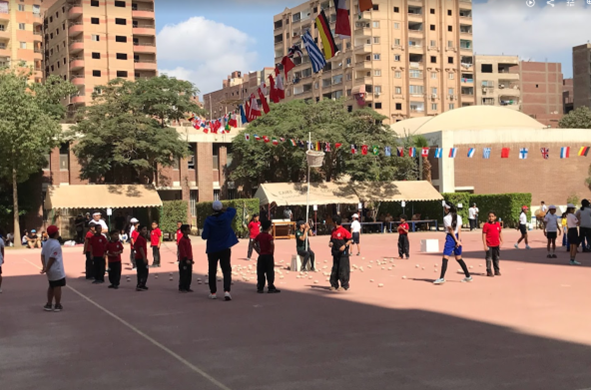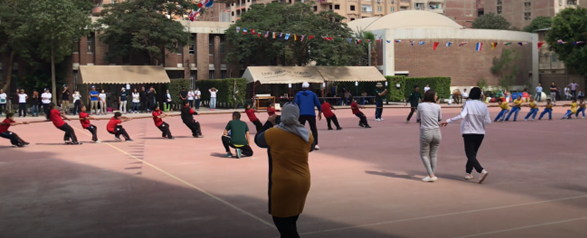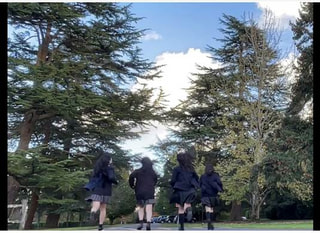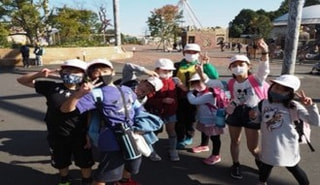Other languages : Arabic,

The Japanese School in Cairo invited students from exchange schools, El Weh and EJS Industrial Zone, as well as students from Cairo University and Canada University, to participate in a sports day. The students were able to compete and cheer with students and students from the exchange schools, and in addition to the vertical ties between different grades that are fostered at sports day, the students were able to develop relationships with students from other schools and engage in cross-cultural exchanges.
By inviting other schools, the Japanese School in Cairo had an opportunity to present the results of their daily practice, and it was also a great stimulus for the exchange schools.



Target grades:
Activity Category:
Time:
All grades
School events, cross-age activities, cross-cultural exchanges
1 day of the event and a rehearsal
![]()
Aims
By inviting students and children from other schools to the sports day, the following development can be expected for the children.
-
Through the exchange of different age groups and cultures at the sports day, students will understand the importance of cooperation and develop a spirit of caring for each other.
-
Through the sports day, children will develop a sense of responsibility and a sense of self-usefulness.
-
Through the support of each school, the children will learn how to interact with others, including how to act considerately and how to speak kindly to others.
![]()
Teaching materials and equipments
・Race
Lane, goal tape
・Ball-toss game
Basket, balls, music
・Tug of war
Rope
![]()
Implementation Procedure
◎Sports Day Program
(★indicates games in which the exchange schools also participate in this case study)
<Opening Ceremony> 8:40~
<Morning Session> 9:00~
1. Preparatory exercise "Radio Exercise"
2. Cheering for the participants
3. Race ★Participation of Exchange Schools
4.Tug of war ★Participation of Exchange Schools
6.Big Ball Rolling, Rolling with Parents and Children
7. Ball-toss game ★Participation of Exchange Schools
8.Eggs! Delivery service!
9.Running Game
10.Soran Bushi (traditional Japanese dance)
<Lunch break> 11:20~12:30
<Afternoon session> 12:30~.
11. Ball-toss game
12.Obstacle race
13.Red and White Relay
<Closing Ceremony> 13:10~
◎Rules for Games in which Exchanges Schools Participate
・Race:
A race in which participants stand at the line of the lane they will run in, prepare to run at the "ready" signal, and run at the signal to start.
①Each competitor stands in his/her own starting lane.
②The competitors get ready for the race by the referee's signal "in position" and "ready” and start the race at the signal of the starting gun.
③Run all the way to the finish line.
・Tug of war:
A game in which two teams pull one tug of war against each other.

①The two teams face each other from a position about 2 m from the center of the rope, and stand next to the rope facing backward to take their positions for the competition.
②At the signal of the referee, both teams hold the rope with both hands and get ready for competition.
③When the start signal is given, both teams head to the back of their own team and pull the ropes together.
④The team whose center of the rope is in its position at the signal of the end of the competition wins.
・Ball-toss game:
Each team throws balls into a basket and competes for the number of balls in the basket.

①Children of each team line up at equal intervals along the line drawn around the basket of the ball drop.
②When music is played, it is the signal to start the game. They dance.
③When the music stops, the children throw the balls that have fallen to the ground into the basket. When the music stops, the players throw the balls into the basket.
④When the music starts, the players stop throwing balls into the basket, return to the line around the basket, and dance.
⑤Repeat from ③ to ④.
⑥When the game is over, the referee counts the number of balls in the basket.
⑦The team with more balls wins.
![]()
References
Those manuals were developed by JICA Volunteers.
Related article
Previous
【Saitama, Japan】"Last Parents' Class Observation" with laughs and tears, created by the students themselves!
Next
【Saitama Prefecture, Japan】 Cultivating a Spirit of Independence - Making Rules for Internet Use by Students for Students




